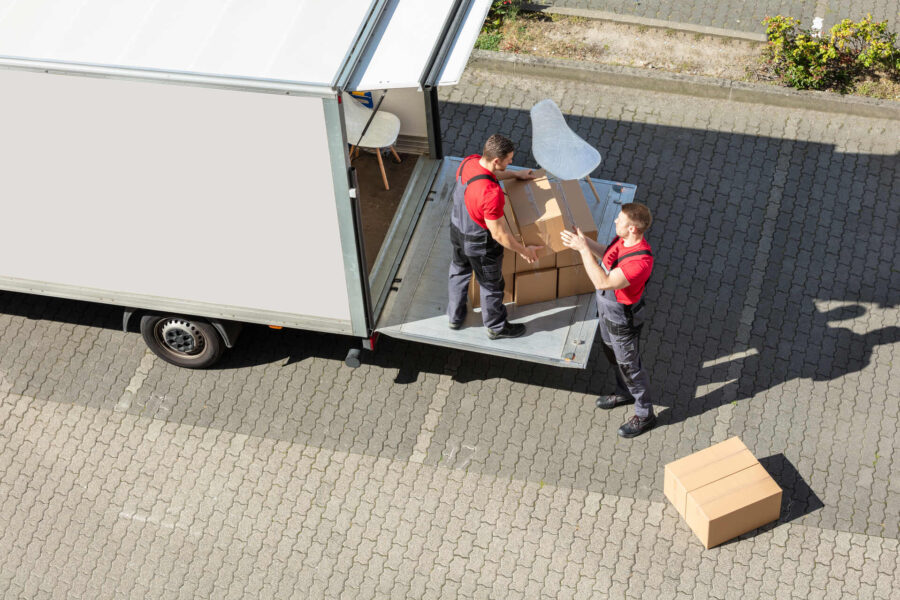

Relocating with Loved Ones: A Guide to Moving Your Family to Another State
Posted in Moving Tips & Tricks on August 25, 2023
Welcome to our ultimate guide on relocating with loved ones! If you’ve ever considered moving your family to another state, get ready for an exciting adventure filled with tips, tricks, and valuable insights. Whether it’s for a job opportunity, a fresh start, or a new chapter in life, we’ve got you covered. Let’s embark on this journey together, making your family’s move a smooth and memorable experience.
What do you need to know about how to move your family to another state? Start by researching potential states to find the one that best suits your family’s needs and lifestyle. Create a checklist and timeline outlining essential tasks and deadlines. Secure housing in the new state, considering factors like proximity to schools and amenities. Declutter and pack efficiently, labeling boxes for easy unpacking. Notify relevant parties of your address change, such as banks, utilities, and subscriptions. Take care of transferring medical records and school documents, ensuring a smooth transition for your children. Lastly, embrace the adventure and involve your family in the process, turning the relocation into a memorable journey together.
Why Are You Moving Your Family to Another State?
Deciding to relocate your family to another state can be a life-changing decision, filled with excitement and apprehension. There are numerous reasons to move, each with its unique set of perks. From pursuing better career opportunities and seeking a more affordable cost of living to embracing a different lifestyle and experiencing a change of scenery, the benefits of moving can be vast.
Exploring new horizons can lead to personal growth, new friendships, and a fresh start for your loved ones. However, it’s crucial to consider the challenges and adjustments that come with such a significant transition.
Research Potential Destinations
Before making any decisions, take the time to research potential destinations thoroughly. Consider your family’s needs and preferences, and decide where to live based on factors like job availability, school districts, safety, and overall quality of life. Utilize online resources and city guides to plan a relocation to another city that aligns with your family’s lifestyle. On top of this, consider taking a where should I move quiz to explore cities that match your requirements and lifestyle needs.
Explore neighborhoods virtually, read reviews from locals, and even take virtual tours to get a feel for the area. Engaging with online communities and social media groups dedicated to the city you’re interested in can also provide valuable insights from current residents.
Consider the Cost of Living Before Relocating
The cost of living is crucial when relocating your family to another state. Use platforms like the Numbeo website to compare the cost of living between your current location and potential destinations. This will help you budget and save money to move more effectively. Being financially prepared will alleviate stress during the transition and give you a clearer idea of what to expect in your new home.
Go Over Job Opportunities
Finding employment in the new city is vital for a successful relocation. If possible, try to secure a job before the move, as this will provide stability and confidence in your decision. Reach out to professional networks and online job platforms to explore potential opportunities. Research companies and industries in the area you’re relocating to, and consider expanding your job search beyond your current field to increase your chances of getting employed in the new city.
Make Sure the Housing Market Can Offer You Plenty of Opportunities
The housing market plays a significant role when relocating, especially if you’re moving to a big city. Research the real estate market in your chosen destination and be prepared to negotiate house prices. Consider working with a local real estate agent who can provide insights and help you find suitable options within your budget. Flexibility and patience can be essential when searching for the perfect home for your family.
Go Over Healthcare Facilities and Education Options
If you’re moving with kids, it’s crucial to consider healthcare facilities and education options in the new city. Use a platform like the AreaVibes website to explore the quality of schools and healthcare services in various neighborhoods. Check for nearby hospitals, clinics, and schools to ensure your family’s well-being and convenience. Reach out to other parents or local communities for first-hand experiences and recommendations.
By thoroughly researching potential destinations and considering the cost of living, job opportunities, housing market, healthcare facilities, and education options, you’ll be well-prepared to make an informed decision, setting the stage for a successful and exciting new chapter in your life.

To Make Everything Easier Create a Moving Plan
Creating a well-organized plan is essential to make moving easier and avoid common mistakes. Start by establishing a timeline for the relocation and setting key milestones along the way. Break down the tasks into manageable steps, ensuring you stay on track and avoid last-minute relocation stress.
Communicate openly with all family members involved in the relocation, discussing expectations and responsibilities. Having a comprehensive plan will provide you with a clear roadmap, making the entire relocation process smoother and more enjoyable.
Establish a Timeline for the Move and Set Key Milestones
Creating a timeline for your relocation is crucial to ensure everything falls into place. Begin by setting a relocation date, taking into account factors like job start dates, school terms, and lease agreements. Consider hosting a moving away party to bid farewell to friends and neighbors, making the transition a more positive experience.
Next, create a relocation inventory, listing all your belongings and categorizing them by importance and fragility. Assign specific dates for packing different rooms and completing other tasks, such as notifying utility companies and arranging transportation.
Determine a Budget and Allocate Funds for the Relocation Expenses
Relocating to another state can be costly, so it’s essential to determine a moving budget early on. Evaluate all the expenses involved, including hiring movers, travel costs, temporary accommodation, and any unexpected fees.
Allocate funds accordingly, and consider budgeting before the relocation to ensure a smooth financial transition. Having a clear understanding of your budget will help you make informed decisions and avoid overspending during this period of change.
Check out the video below for some great budgeting tips ahead of any plan:
Develop a Checklist of Tasks and Responsibilities for Each Family Member
Creating a moving to another state checklist is an excellent way to divide responsibilities and ensure a stress-free relocation experience for every family member. Assign specific tasks to each person based on their capabilities and preferences.
This could involve packing their belongings, handling paperwork, or taking care of pets during the relocation. Regularly review the checklist together to track progress and make adjustments as needed. Collaborating as a team will not only lighten the load but also create a sense of unity as you embark on this exciting journey together.

Prepare Your Children for the Move
Relocating with children requires thoughtful preparation and consideration. Start by having an open and honest conversation with your kids about the upcoming relocation, addressing their feelings and concerns. Involve them in the process by allowing them to pack their belongings or choose the decor for their new room.
Familiarize them with the new area by showing them pictures or videos, and take a family trip to explore the new city together. Maintain routines and schedules as much as possible during the transition to provide stability.
Have Open and Honest Conversations With Your Children About the Move
Having open and honest conversations with your children about the move is essential to help them understand and cope with the upcoming changes. Here’s how you can do this:
- Choose an appropriate time and place: Find a quiet and comfortable setting where your children feel at ease to express their feelings and ask questions.
- Use age-appropriate language: Tailor your explanations to each child’s age and comprehension level, ensuring they fully understand the reasons for the relocation.
- Acknowledge their feelings: Encourage your children to share their emotions, whether it’s excitement, fear, or uncertainty, and let them know that all feelings are valid.
- Be positive and optimistic: Emphasize the positive aspects of the transition, highlighting new opportunities and adventures waiting for them in the new city.
Address Their Concerns and Anxieties, Providing Reassurance and Support
Moving can be a traumatic experience for children, and addressing their concerns and anxieties is crucial to easing their transition. Here are some tips to provide reassurance and support:
- Listen actively: Be attentive when your children express their worries and anxieties about the transition, offering empathy and understanding.
- Validate their feelings: Let them know that it’s normal to feel nervous or anxious and that many people go through similar emotions.
- Share positive relocation experiences: Share stories of other families who have moved and had positive outcomes, emphasizing how they made friends in a new city and adapted to their new environment.
- Involve them in the process: Encourage your children to participate in the planning and decision-making, making them feel more in control and invested in the process.
- Organize play dates or meetups: Arrange playdates or virtual meetups with other children who live in the new city, giving your children an opportunity to make connections before the relocation.
By having open discussions and providing the necessary support, you can help your children navigate the relocation process with greater ease and understanding, ensuring a smoother transition.

Organize Logistics and Hire Professional Long Distance Movers
When moving across the country, organizing logistics is crucial to a successful and worry-free relocation. Consider investing in reputable cross-country moving services. Professional cross-country movers have the expertise and resources to manage the entire process efficiently.
By entrusting your belongings to them, you can focus on other important aspects, such as settling into your new home and taking care of your family. Moreover, cross-country movers offer added benefits, such as insurance coverage, safe handling of fragile items, and timely delivery, ensuring a seamless transition to your destination.
Arrange for Necessary Long Distance Moving Services
Moving cross country can be a breeze if you consider arranging for a comprehensive set of long-distance moving services. Professional movers offer packing services, relieving you of the time-consuming and exhausting task of packing up your entire household. They can efficiently and securely pack your belongings, utilizing high-quality packing materials to protect your items during transit.
On top of this, consider utilizing auto transport services if you need to relocate your vehicles. This convenient option saves you from undertaking a lengthy and tiring road trip. Lastly, explore storage services movers provide, offering a safe and secure space to temporarily keep your belongings, especially if your home is not yet ready for move-in.

Manage Finances and Legal Matters
Managing your finances and legal matters is essential when planning a relocation to ensure a smooth and cost-effective transition. Research the cheapest way to move, considering options like hiring professional movers, renting a relocation truck, or using portable containers. Comparing quotes from different relocation companies can help you find the most affordable option without compromising on quality. Also, take care of legal matters related to the relocation, such as updating your address with government agencies and arranging for mail forwarding.
Notify Relevant Parties About the Move
It’s crucial to notify relevant parties about your change of address. Inform banks, insurance companies, schools, utility providers, and other essential institutions about your upcoming relocation. This will ensure that you receive important documents and avoid any disruptions to your services. Set a checklist of whom to notify, and consider doing this well in advance to give these organizations ample time to update their records.
Research and Understand the Tax Implications of Moving to the New State
Some states have different tax rates, deductions, and filing requirements, which could affect your financial situation. Consult with a tax advisor or research online resources to gain clarity on any tax changes that may apply to you after the relocation. Being well-informed will help you plan and budget more effectively for any potential tax adjustments.
Update Your Legal Documents
Organize important documents and ensure they are up to date before the relocation. This includes identification cards, driver’s licenses, passports, and any legal or financial records. Check the new state’s requirements for updating such documents, and prepare the necessary paperwork in advance. Keeping your documents current will help smoothen various aspects of your relocation, such as renting a new home, enrolling in schools, and accessing essential services in the new state.

Follow Our Guide and Your Family Will Relocate Without a Fuss
Congratulations! You are now equipped with a comprehensive guide to make your family’s cross-country relocation a breeze. By preparing your children, organizing logistics, and addressing financial and legal matters, you can ensure a smooth and stress-free relocation. Don’t forget to involve your kids in the process and provide the reassurance they need during this exciting journey.
For the ultimate seamless relocation, consider enlisting the expertise of Cross-Country Movers, your trusted partner in handling all aspects of your cross-country relocation. From packing services and auto transport to storage solutions, we’ve got you covered. Contact us today and let our dedicated team turn your family’s cross-country move into a delightful adventure!
FAQ
How Do I Choose the Best School for My Children in the New State?
Research schools in the new state, considering factors like academic programs, extracurricular activities, and proximity to your home. Reach out to school administrators, visit campuses if possible, and seek recommendations from locals to make an informed decision.
What Resources Are Available to Help My Family Adjust to the New Community?
Utilize community centers, online forums, and social media groups to connect with locals and learn about events and activities. Many cities have newcomer programs that offer support and resources to help families settle into the new community.
How Can I Support My Children’s Emotional Well-Being During the Transition?
Be attentive and empathetic to their feelings throughout the process. Encourage open communication, engage in fun activities to alleviate stress, and consider professional counseling if needed to help them cope with the changes.
How Do I Handle Potential Challenges or Resistance From Family Members Regarding the Move?
Have open conversations and address concerns while emphasizing the positive aspects of the relocation. Involve family members in the decision-making process, and be patient and understanding as they adapt to the idea of relocating.
What Are Some Strategies for Maintaining Long-Distance Relationships With Friends and Family in the Previous State?
Utilize technology to stay connected through video calls, social media, and messaging apps. Plan visits or organize virtual gatherings to maintain strong bonds despite the distance.
How Can I Balance Work and Family Responsibilities During the Transition Period?
Create a flexible schedule to accommodate both work and family commitments. Delegate tasks and ask for support from family members, friends, or colleagues to ease the workload during this transition. Prioritize self-care to manage stress effectively.







